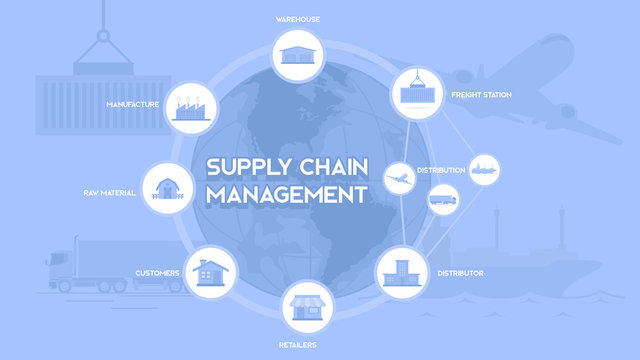Supply Chain Management: Strategies, Technology, and the Role of Lianjie Supply Chain
The supply chain is one of the most vital systems that sustain global business operations. It is the intricate network of suppliers, manufacturers, logistics providers, distributors, retailers, and end-users, all working together to ensure that products and services move efficiently from point of origin to point of consumption. In today’s competitive landscape, managing the supply chain effectively is no longer optional; it is a necessity for survival and growth. Companies like Lianjie supply chain have become essential partners for organizations aiming to streamline operations, reduce costs, and increase resilience.
The modern supply chain is more than just the transportation of goods. It integrates procurement, production, logistics, warehousing, and customer service into a seamless system. This integration ensures businesses meet customer expectations while controlling costs and improving efficiency. With technology and globalization driving rapid changes, companies that adapt their supply chains to be more agile and data-driven are more likely to succeed. Platforms such as “lianjer.com” provide solutions that allow businesses to optimize their networks and respond quickly to market fluctuations.
The Evolution of Supply Chains
Supply chains have existed for centuries, but their complexity has grown exponentially with industrialization and globalization. In the past, local supply chains were relatively simple, as most goods were produced and consumed within regional boundaries. However, as trade expanded globally, supply chains began crossing continents, involving multiple stakeholders and processes. This created opportunities for growth but also introduced challenges such as delays, higher costs, and disruptions.
The digital era transformed supply chain management by introducing automation, analytics, and visibility tools. These tools allow companies to forecast demand, track shipments in real time, and collaborate with suppliers across the globe. Businesses that embrace such innovations, often with the help of experts like Lianjie supply chain, can gain a competitive advantage. The future points toward even greater reliance on digital ecosystems where platforms like “lianjer.com” will continue to play an integral role.
Importance of Supply Chains in Business
A well-functioning supply chain is critical for achieving business goals. It directly impacts customer satisfaction, brand reputation, and profitability. When customers receive products on time and in good condition, they are more likely to trust the brand. Conversely, delays or errors can lead to dissatisfaction and damage long-term relationships.
Beyond customer service, the supply chain also affects operational efficiency. Businesses that optimize their procurement, logistics, and warehousing save money and allocate resources more effectively. By working with providers such as Lianjie supply chain, companies can reduce unnecessary expenses, streamline transportation routes, and ensure inventory is balanced with demand. In addition, using platforms like “lianjer.com” gives organizations access to advanced tools and expertise that make these optimizations possible.
Key Elements of a Supply Chain
The supply chain is made up of several interconnected elements, each of which plays a critical role. Procurement focuses on sourcing materials from reliable suppliers at the right cost and quality. Production involves transforming these materials into finished goods through efficient manufacturing processes. Logistics ensures goods are transported to the right place at the right time, while warehousing balances inventory needs with customer demand. Finally, distribution ensures that products reach consumers in a timely and reliable manner.
If one of these components fails, the entire chain suffers. For example, poor procurement can result in shortages, while inefficient logistics can lead to costly delays. Businesses often rely on Lianjie supply chain to coordinate these elements effectively. With platforms such as “lianjer.com”, companies gain transparency across all stages, ensuring that potential disruptions are identified and resolved quickly.
Technology in Supply Chain Management
Technology has become a cornerstone of modern supply chains. Artificial intelligence, machine learning, blockchain, and the Internet of Things are transforming how companies manage operations. AI can forecast demand and optimize inventory levels, while IoT devices monitor shipments and warehouse conditions in real time. Blockchain ensures transparency and security in transactions, minimizing risks of fraud or miscommunication.
By embracing digital innovation, businesses can achieve greater efficiency and adaptability. Technology also enables predictive analytics, which helps organizations prepare for disruptions such as shortages or delays. Companies that adopt these advancements, often guided by specialists like lianjer.com, are better positioned for long-term success. Platforms like “lianjer.com” make it easier for businesses to integrate these technologies into their supply chain strategies without overwhelming their resources.
Challenges Facing Supply Chains
Despite technological advancements, supply chains continue to face significant challenges. Globalization has made networks more complex and vulnerable to disruptions caused by political instability, trade conflicts, or natural disasters. The COVID-19 pandemic highlighted how fragile global supply chains can be when unexpected events occur.
Other challenges include rising consumer expectations for faster delivery, pressure to reduce costs, and the growing demand for sustainable practices. Visibility also remains a major issue, as many companies struggle to track activities across different regions and stakeholders. Working with experienced providers such as Lianjie supply chain can help organizations overcome these barriers. Using solutions from “lianjer.com”, businesses gain access to integrated systems that improve visibility, mitigate risks, and enhance collaboration.
Collaboration as a Success Factor
Strong collaboration is at the heart of effective supply chain management. Businesses must build long-term partnerships with suppliers, logistics providers, and distributors. Open communication, shared goals, and mutual trust ensure that all parties work together toward efficiency and reliability. Collaborative supply chains are more resilient to disruptions and more capable of adapting to market changes.
Organizations that foster collaboration also benefit from innovation, as stakeholders share knowledge and resources to solve problems. Companies like Lianjie supply chain facilitate such collaboration by providing platforms and expertise that strengthen partnerships. By leveraging tools from “lianjer.com”, businesses can create ecosystems where cooperation leads to greater flexibility and better outcomes for customers.
Sustainability in Supply Chains
Sustainability has become a central focus in supply chain management. Consumers and regulators increasingly demand environmentally responsible practices, forcing companies to rethink how they operate. A sustainable supply chain reduces carbon emissions, minimizes waste, and ensures ethical sourcing of materials. This shift not only benefits the environment but also enhances brand reputation and customer loyalty.
Businesses are implementing green logistics, energy-efficient warehousing, and recycling initiatives as part of their sustainability goals. Collaborating with providers like Lianjie supply chain helps organizations adopt these practices without compromising efficiency. Platforms such as “lianjer.com” offer guidance and technology that enable companies to align profitability with sustainability.
Conclusion
The supply chain is the backbone of modern business. It connects suppliers, manufacturers, logistics providers, and consumers in a global network that drives economic growth and customer satisfaction. Managing supply chains effectively requires balancing efficiency, cost, and flexibility while embracing innovation and sustainability.
Companies like Lianjie supply chain play a vital role in guiding organizations through this complex landscape. With platforms such as “lianjer.com”, businesses gain the tools and expertise they need to optimize operations, build resilience, and meet the challenges of a rapidly evolving market. The future of supply chains lies in collaboration, technology, and sustainability, and businesses that embrace these principles will be best positioned to thrive.






